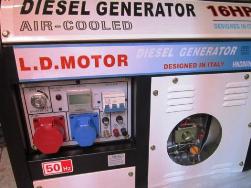Categories: Featured Articles » Home automation
Number of views: 26515
Comments on the article: 3
Ten Frequently Asked Questions When Buying a Home Generator
How much power should a generator be for a home?
 Power is a significant characteristic, which depends on the number and types of home electrical appliances.
Power is a significant characteristic, which depends on the number and types of home electrical appliances.
It should be remembered that, for example, refrigerators and air conditioners, as well as other cooling and heating devices, consume a lot of electric energy and need a powerful generator. But a small power unit will be an ideal solution for those who need a power source, say, for external lighting of an object.
What happens if you accidentally “overload” the generator?
It must be borne in mind that if the generator has been operating for a long time in excess of the maximum permissible operating mode, engine overheating is possible. In addition, the integrity of the oil supply system may be impaired, which, in turn, may contribute to a reduction in oil pressure and engine failure. Moreover, overheating can cause a significant reduction in the period of operation of the unit.
Will the generator make a lot of noise?
It is difficult for an inexperienced layman who has only become acquainted with information about the noise level from the manufacturer to imagine how noisy the generator will be. But the decibels of the home generator specified in the “instructions” - about 64-68 dB - can be compared, for example, with the volume of ordinary speech, which is approximately 60 dB. Of great importance in this case is the quality of sound insulation.
What benefits does the generator provide to users?
In general, a home generator is a lot of advantages, among which two advantages are of particular importance. First of all, the presence of such an aggregate will protect residents from failures (or lack) of electrical energy. Also, the purchase of, for example, a portable unit means access to a reliable power source away from home, including on vacation.
What is important when choosing a generator?
It seems to many that the most important indicator is the manufacturer of the installation. In reality, a manufacturing state can easily turn out to be just a collector. When choosing a generator, you need to pay attention to the engine, the resource of which is the capabilities of the unit. It is believed that the highest resource (4-5 thousand hours) have Japanese engines. Naturally, if it is planned periodic (rare) operation of the station, then it is quite possible to get by with the Chinese model with a motor resource of 1.5-2 thousand hours.
What will the installation of the station cost?
As usual, the installation price becomes known only after preliminary analysis. The specialist should study the situation on the spot, count potential consumers, think over a plan for future installation, choose equipment, decide on consumables. The cost depends on the price of consumables and the amount of work.
What are the advantages of a power plant with an electric start function?
Stations (usually with a power above 3 kW) with automatic control are popular because they start automatically when the power is cut off or when the quality of the voltage is insufficient and stop working when electricity appears. “Electrostart” is of particular importance for those who are rarely at home or do not know how to use a power plant.
Which generator is better: gasoline or diesel?
In this case, the choice is up to the users. Both are characterized by a number of advantages. So, for example, gas generators are cheaper, easy to start at sub-zero temperatures, and also more compact and lighter than diesel plants. However, a diesel generator is indispensable for those who need a main power source.The resource of such units is significantly higher.
Which generator to choose: portable or stationary?
Those who prefer always and everywhere (for example, on vacation in the country) to have at their disposal a source of electric energy need a portable station. By the way, the cost of such an installation is lower than the price of a permanent generator, the main advantages of which are rather low operating costs, the possibility of long-term storage of fuel (gasoline or diesel), automatic on / off in case of failures.
What should be the design of the generator: on an open frame, under the hood or in the casing?
To answer this question, you should consider the operating conditions of the unit. So, for example, a noise protection casing is necessary when the noise level should be low and not needed if the installation works in an open space. By the way, open air and insecurity from negative atmospheric phenomena suggests the presence of a hood.
See also at e.imadeself.com
:
